Household Bills
Wet weather and rising pump prices see shoppers cut spending

Drivers curbed their spending on fuel as pump prices surged, while the wet weather also impacted retail sales, according to the latest statistics for January.
Fuel sales saw a large fall of 5.7% in January 2020 when compared with December 2019, which coincides with a 2.3p rise in pump prices at the beginning of the year.
The Office for National Statistics (ONS) said a continued increase in fuel prices was seen from March 2019 until a sharp fall in prices in June 2019. Then in January 2020, there was an increase of 1.9% when compared with December 2019.
However, it added that anecdotal feedback from retailers also suggested the wet weather in parts of the country may have reduced fuel sales.
Overall, the ONS reported that retail volumes increased 0.9% and spending increased 1.2% in the month, recovering from falls in the previous two months. It cited a moderate growth in food stores (1.7%) and non-food stores (1.3%).
But, in the three months to January, retail sales actually declined 0.8% and spending fell by 0.5% when compared with the previous quarter.
When compared with a year earlier, both measures reported growth at 2.1% for the amount spent and 0.8% for the quantity bought.
Online sales as a proportion of all retailing was 19% in January, down from 19.3% in December 2019.
‘Shopping down the list of priorities’
Paul Dales, chief UK economist at Capital Economics said the rise in month-on-month retail sales gave consumers the confidence to “reopen their wallets”.
He said: “Admittedly, sales are unlikely to climb at this pace for long as some of it is probably just a catch up from the previous weakness. What’s more, the extremely wet weather and floods will have pushed shopping down the list of priorities in February (apart from for sand bags and wellies). And the effects of the coronavirus may be hurting sales in areas frequented by Chinese tourists (Bicester Village) and may lead to shortages of some products (clothing, electrical appliances) in March.
“Nonetheless, we estimate that the paltry 0.1% quarter-on-quarter rise in household spending in Q4 will be followed by something like a 0.4% q/q gain in Q1. And the MPC will be pleased to see that the recent surge in sentiment is filtering through into a pick-up in the actual activity data.”